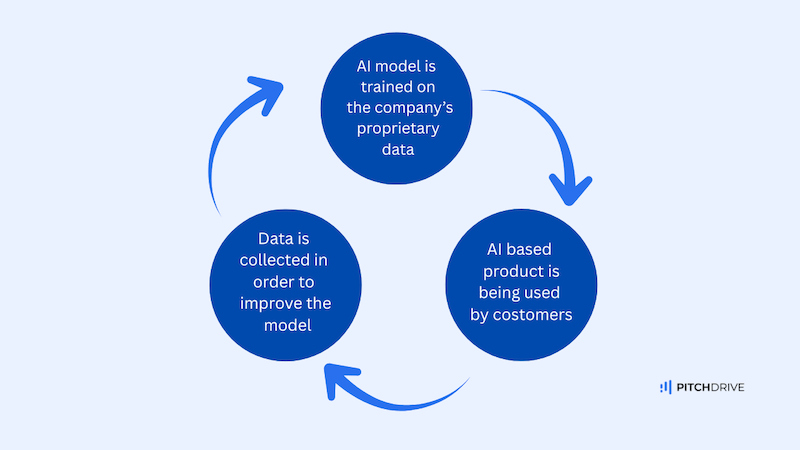How Startups Can Build a Powerful Data Moat: Turn Your Data Into a Competitive Advantage
Written by
Published on

Written by
Published on

Your data is decaying without intelligence. Many startups sit on piles of valuable information that never gets used. It’s static, passive, and stuck in old systems. The real opportunity lies in making data work for you. With an AI first approach, your data becomes dynamic and learns from every interaction. It starts building unique insights that competitors cannot copy. That is what creates a data moat, a growing advantage that protects your startup and helps you scale faster.
A data moat is a competitive advantage built through unique and proprietary data that competitors cannot easily copy. It is what turns ordinary information into a long-term edge. Startups that manage to collect and use exclusive data gain insights that make their products smarter, more personal, and harder to replace.
Think of it as building a wall around your business that strengthens with every user interaction. Companies like OpenAI grow their data moat as their models learn from millions of prompts. Fintech platforms refine algorithms through customer transactions and behavior, making their systems more accurate with each use.
Proprietary and exclusive data
The data is gathered in ways that make it difficult for others to access. It can come from user activity, product interactions, or exclusive partnerships. This data becomes a key differentiator.
Strategic use
Strong data moats come from how the data is used. When a startup turns insights into better recommendations, faster service, or predictive features, it builds a defensible position that is hard to match.
Traditional moats like brand or distribution can take years to develop. A data moat compounds faster because every user, transaction, or feedback loop makes the product smarter. When used effectively, it helps startups win new customers, retain existing ones, and generate even more valuable data over time.
The result is a self-reinforcing cycle of growth. Each interaction adds strength to the moat, creating a barrier that makes your startup increasingly difficult to compete with. In short, data fuels defensibility, and defensibility drives growth.
A strong data moat grows stronger with every user interaction. It learns, adapts, and evolves over time. The more data a startup collects and uses intelligently, the harder it becomes for others to catch up. Three core forces drive this process: the data flywheel, proprietary data, and edge-case intelligence.
The data flywheel is a self-reinforcing loop. More users generate more data. That data improves the product, which attracts even more users. Each cycle makes the system smarter and more valuable. Think of how streaming platforms improve recommendations as more people watch, or how fintech apps detect fraud faster as they process millions of transactions. Every interaction adds another layer of insight.
Proprietary data is information that only your company can access. It can come from exclusive partnerships, unique user activity, or custom integrations. This kind of data cannot be easily duplicated, which makes it one of the strongest forms of defensibility. When startups collect and protect this data, they create an advantage that grows in value as the company scales.
Edge-case intelligence focuses on learning from rare or highly specific situations. These are moments where generic models often fail. Startups that capture this type of data can create exceptional products for specialized markets such as healthcare, finance, or logistics. For example, an AI trained on unusual medical patterns can detect conditions that others overlook. This makes the product more accurate and trusted within its niche.
Together, these elements create momentum. The flywheel accelerates learning, proprietary data strengthens exclusivity, and edge-case intelligence deepens expertise. The result is a moat that becomes harder to cross with every turn.

A formidable data moat is built on quality, learning, and connection. It goes beyond collecting information and focuses on turning that information into a living system that keeps growing smarter over time.
The foundation lies in unique and high-quality data. Startups that collect accurate, relevant data gain insights that directly improve their products and operations. With an AI-first setup, this data continuously learns from every interaction, strengthening predictions and refining decisions. Each new user adds fresh input, creating network effects that make the product smarter and harder to compete with.
Integration also plays a key role. When data flows freely between systems, it reveals patterns that isolated datasets cannot. This connected intelligence allows startups to act faster and anticipate needs. At the same time, legal and ethical standards such as GDPR compliance build trust and make the data ecosystem more defensible.
A data moat is never complete. It grows through continuous refinement, better data sources, and smarter models. As the startup evolves, so does its moat, reinforcing itself with each cycle of learning and use. The startups that master this rhythm create something competitors cannot easily replace a living, learning advantage that only gets stronger with time.
Building a data moat is about turning everyday interactions into lasting intelligence. It requires structure, discipline, and a clear plan for collecting and using data in a way that compounds over time. Below are four key actions that help startups build a strong and defensible data advantage.
Every click, search, and transaction holds value. By systematically collecting and cleaning user activity data, startups can uncover patterns that improve predictions and personalize experiences. The goal is to create a structured, high-quality dataset that becomes the foundation for smarter models and better decision-making.
Feedback is one of the most powerful forms of data. When users correct errors, rate experiences, or share opinions, they are teaching your system. Incorporating this feedback directly into your product design helps it improve naturally over time. Each interaction sharpens your product and strengthens the moat.
Some advantages come from access that others do not have. Startups can buy exclusive datasets, form partnerships, or acquire smaller companies to gain unique data. This type of proprietary information gives your business an early edge and makes it difficult for competitors to replicate your insights.
The strongest data moats often grow in focused markets. Specializing in one domain, such as health, finance, or legal AI, allows you to gather more accurate and relevant data. Over time, your models become experts in that niche, creating precision and trust that broad competitors cannot match.
Smart startups know that data is only valuable when it drives growth. Static information sitting in a database creates no momentum. But once it starts learning, connecting, and evolving, it becomes one of the strongest competitive assets a company can build.
The shift from static to intelligent data marks the difference between a reactive and an adaptive business. When data systems continuously learn, every user interaction improves accuracy and personalisation. Insights become sharper, decisions faster, and products smarter. This creates a cycle of growth where learning fuels improvement and improvement attracts more users.
An intelligent data system builds strength over time. Smarter models lead to better insights. Better insights attract more users. More users generate more data. This loop compounds into a data moat that becomes difficult to match. Startups that master this cycle enjoy faster learning, stronger defensibility, and higher investor confidence. It is what turns a good product into a scalable, durable business.
The ultimate goal is for your product to become part of the industry’s core fabric. It starts as a simple service, grows into a community that shares and refines data, and eventually becomes infrastructure that others rely on. Products like GitHub or Gmail reached this point because their data, usage, and trust formed an irreplaceable foundation for users and developers alike.
Investors today look for moats that last, not short bursts of growth. A strong data moat compounds in value with every interaction. It helps startups defend their market position, attract capital, and sustain long-term impact.
Without intelligence, your data decays. With it, it compounds. The difference lies in how you use it. Collecting information alone does not create value. The real strength comes from transforming that information into insight, learning, and continuous improvement.
Founders who think strategically about their data build companies that last. Every user interaction, every feedback loop, and every model update strengthens the moat around their business. Over time, that intelligence becomes the foundation of real defensibility.
To explore more ways to build an AI-first mindset and strengthen your data strategy, visit Pitchdrive Academy.
Explore:
⏩️AI-first or Die: the SaaSpocalypse is Here
⏩️Top AI-Focused Investors and Venture Capital Firms in Europe
⏩️Accurate Startup Exit Valuation: Your Guide to a Profitable Exit
We're always looking for new partners and investment possibilities:
🌱 Pre-seed and seed stage (ticket size €250k-1M)
🏎 Highly product and scale driven
🇪🇺 European focussed
🕸 Industry agnostic